With a hotel search landscape dominated by the likes of Airbnb, online travel agents, and metasearch engines, local SEO is a powerful route for hotels to carve out an online presence for their business. By implementing a set of solid local SEO strategies, hoteliers can lower the commissions given to third-party vendors and increase their overall revenue.
Whether you’re a small boutique lodging or a multinational hotel chain, this article will give a set of strategies for how to leverage the power of local SEO for hotels to rise above the digital noise, show up on the map and get more direct bookings for your website. Let’s dive in!
How local hotel SEO drives bookings
In our complete guide to hotel SEO, we mentioned that SEO is about optimizing a website to appear in organic search results for keywords.
With local SEO for hotels, however, the aim is to increase visibility for a specific type of keyword: local keywords.
A local keyword is a phrase such as ‘hotels near me’ or ‘hotels in [destination]’ that somebody who is planning a trip may ask a search engine.
The increased visibility with local keywords comes mainly from the Hotel Pack, which is the map of relevant hotels that Google returns when someone searches for a hotel-related keyword.
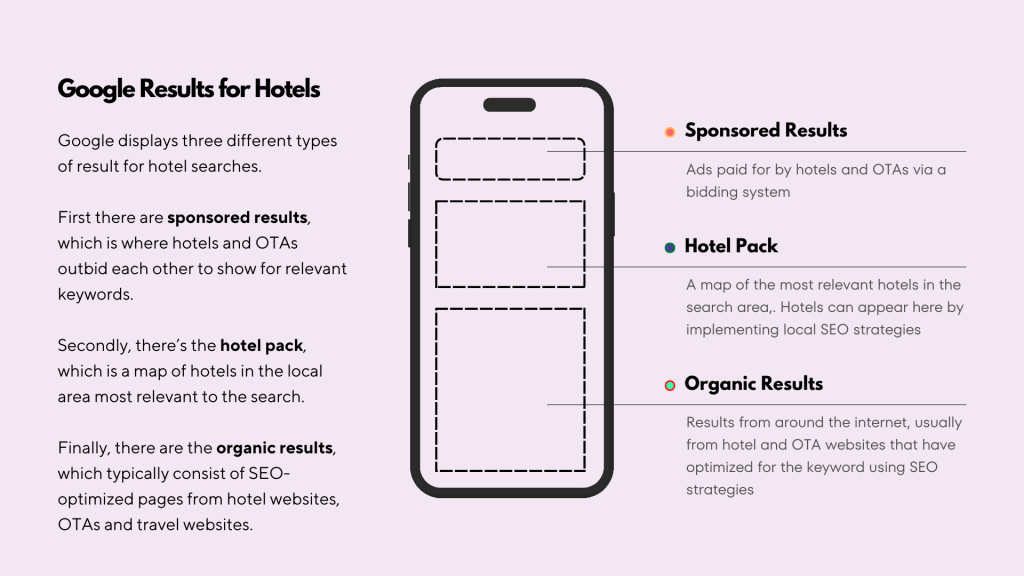
While sponsored results require a paid investment in the form of geo-targeted pay-per-click ads, and organic results mainly return individual pages from hotel and booking websites, the Hotel Pack offers the chance to show your hotel’s Google Business Profile (with a booking link) to travelers looking for accommodation.
The set of strategies used to optimize your Google Business Profile for the Hotel Pack makes up a large portion of what is known as local SEO for hotels.
By optimizing your Google Business Profile, you not only increase the probability of searchers finding your hotel listing, but you also build trust and credibility with potential guests.
This is why we offer our dedicated Local Visibility packages to hoteliers, designed to launch your hotel the top of the Hotel Pack and driving significantly more bookings.
Show your business to interested travelers
Our Local Visibility package drives exponentially more bookings from local search to your business, month-on-month, year-on-year.
Find out howLocal keyword research for hotels
Keywords are the phrases people use to search the internet, and any local hotel SEO strategy should start with identifying the keywords that travelers might use when they’re looking for a hotel that fits your description.
By playing to your hotel’s unique selling points through local keyword research, you will be able to tailor your SEO strategy and increase your chances of attracting travelers who are ready to book the type of accommodation you provide.
To identify which keywords to target, you should start by listing your hotel USPs (unique selling points), which will form the basis of your keyword strategy.
The most obvious USP to start with is location. Where is your hotel based? When people travel to your destination, do they look for hotels in the entire region, in the nearest city, or close to a local landmark, such as a beach?
Location is one of the triggers for keywords that display the Hotel Pack in Google, and keywords with locations are probably the most used of all local hotel keywords. Some examples include:
- ‘hotels in [city]’
- ‘hotel near [landmark]’
- ‘boutique hotels in [country]’
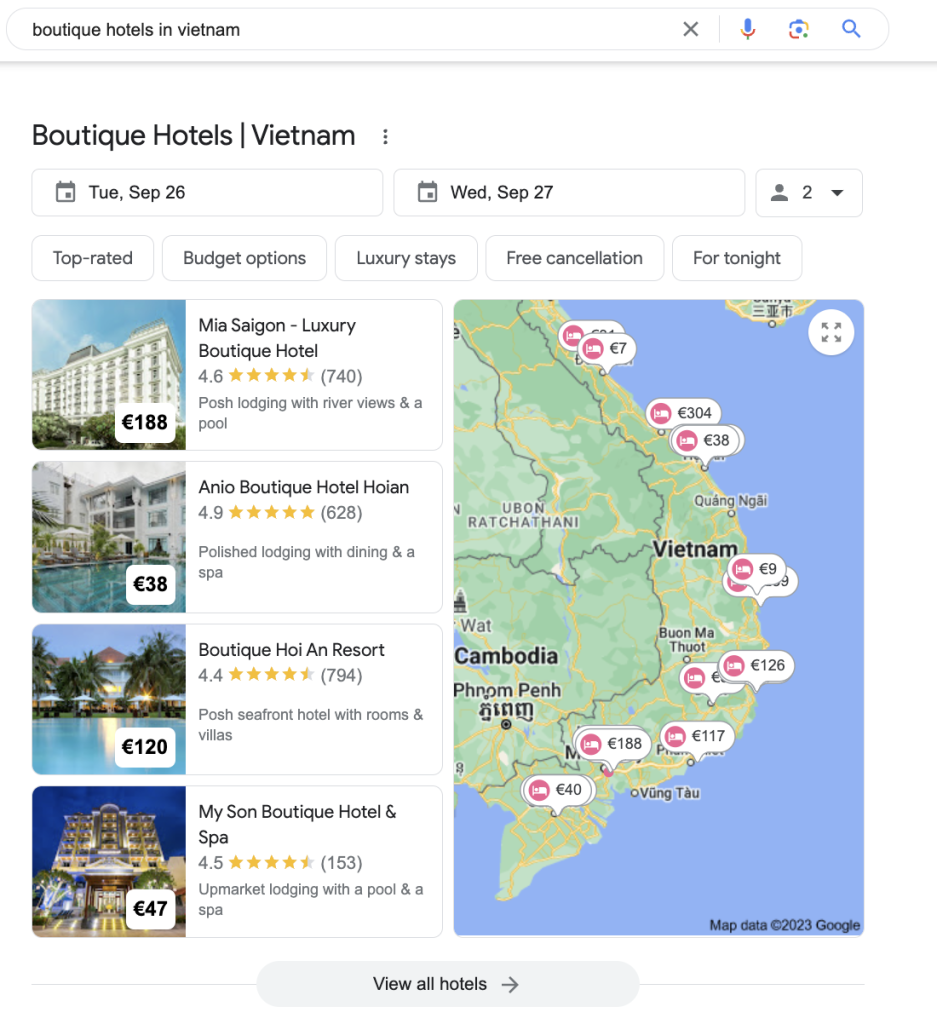
As you can see in the example above, the type of hotel or accommodation you operate is another USP that can be used for keyword research.
The keyword ‘boutique hotels in vietnam’ indicates that the searcher is looking for boutique hotels. Other local keyword ideas for types of accommodation that you can tailor your strategy towards might be:
- Luxury hotels in [location]
- Bed and breakfast in [location]
- Hostels in [location]
The third USP to consider is the unique features or amenities of your hotel. These could be specific facilities, such as a swimming pools, spas or gyms, or they might be distinctive feature sof your rooms, such as balconies, suites, and kitchenettes.
Examples of keywords that include amenities, as well as the other USPs I’ve already mentioned, include:
- Boutique hotels with jacuzzi in [location]
- Luxury hotel with rooftop pool in [location]
- Hostels with private rooms [location]
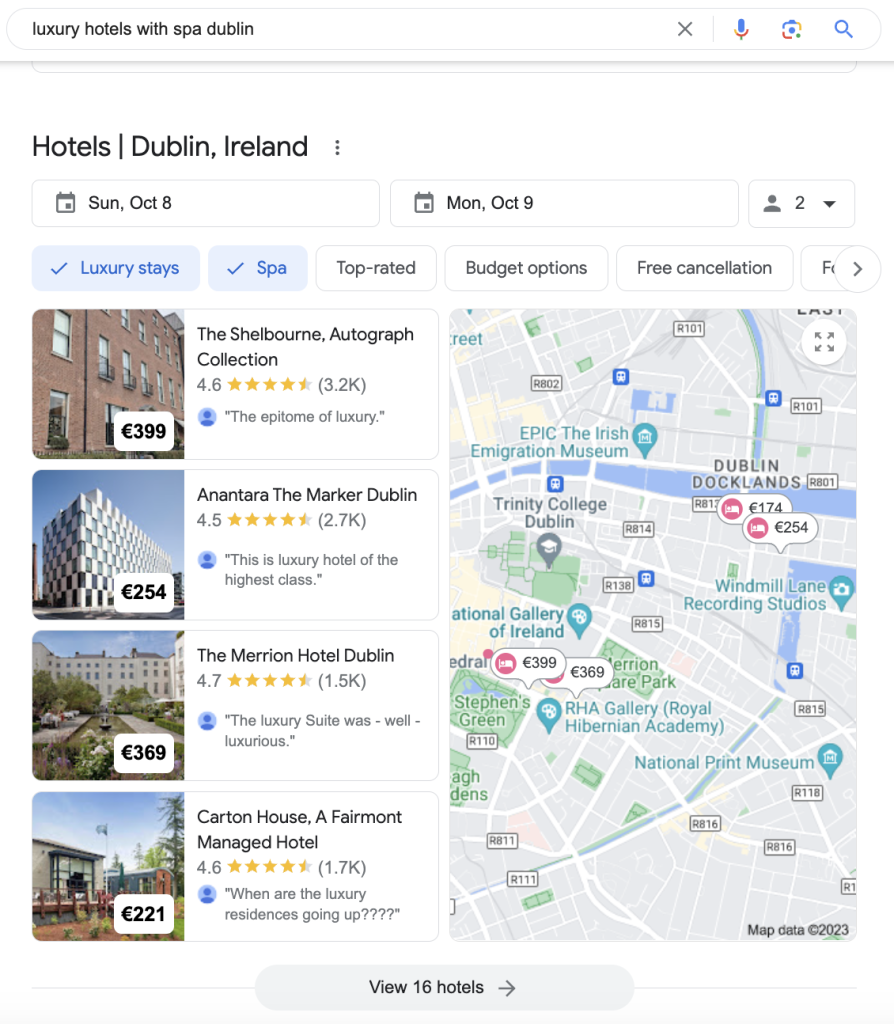
Generally speaking, the more specific USPs that you can base your keyword research around, the more scope you will have to rank your hotel’s website and profiles for your chosen keywords.
This is because longer, more specific keywords tend to have less competition. Rather than trying to compete with all the hotels in your city for a general keyword like ‘hotel in [city]’, optimizing for a keyword like ‘boutique hotel with spa in [city]’ will give you a better shot at rising in the rankings.
At this stage, you could move to a keyword research tool such as Ahrefs, SEMrush or Moz to get real-world data on the keywords that people search for when looking for a hotel that fits your USPs.
However, this data is simply validation on the information you’ve already gained by brainstorming your hotel’s unique selling points. From there, you can start to optimize your website and Google Business Profile around the terms that travelers use to find your business.
Set up and optimize your hotel’s Google Business Profile
Google Business Profiles are the listings that appear for hotel searches on Google, whether in the knowledge panel at the side of the search results, or in the Hotel Pack itself:
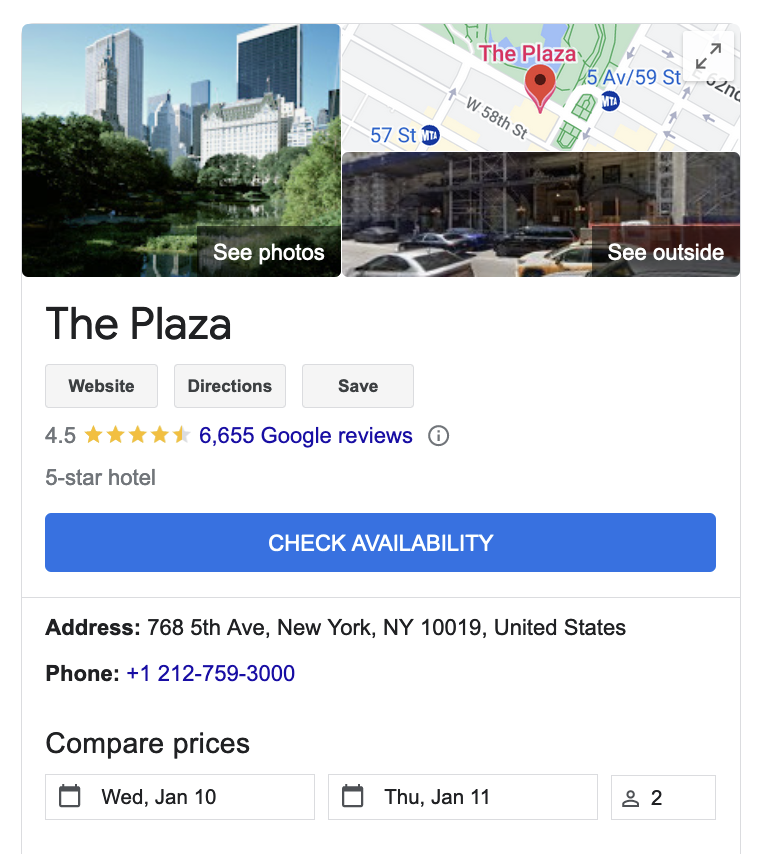
Having a Google Business Profile is essential for basically all types of hotel who are interested in promoting themselves on the internet. Not only does it help you to connect with potential guests and manage your online presence, but without a Google Business Profile, your hotel and nightly rates won’t show up on Google when people are searching for accommodation.
Google Business Profile optimization is a key strategy for local hotel SEO, and it refers to the process of tailoring your Google Business Profile to match the local keywords people are searching for.
Let’s walk through how to set up a hotel profile with Google, and then how to optimize your profile to rank better for local hotel keywords.
The first step is to set up and verify your Google Business Profile:
- Go to business.google.com and look for your hotel: if a listing already exists, you’ll have to claim it (If not, click “Add your business to Google”)
- Enter the name of your hotel, address, phone number, and website – keep a note of the exact details you entered, because these details need to be consistent across the internet
- Choose a verification method, which is normally a postcard sent directly to your accommodation containing a code for you to relay back to Google
Verification can take several days, although sometimes this can be quicker (Google sometimes offers different verification methods). Once you’re verified, the next task is to fill in the different sections in your hotel’s Business Profile with information about your offering.
The most important sections to fill out are:
- Hotel name: this should be accurate and match your hotel’s name on any other third-party platforms
- Category: Google offers three categories for accommodations, which are hotels, vacation rentals, and outdoor lodgings. Make sure to choose the one most relevant for your business.
- Address: This should be a full address, with street name, number, postcode, city and country, and it should match exactly to how your address is listed on other websites
- Phone number: Give a working phone number so that guests can contact your front desk directly
- Website link: This should be a link to your hotel website’s homepage, rather than a link to the booking page (which is added separately)
- Booking link: give a direct link to the booking page for your official hotel website, or your main third-party booking provider
Note that hotel listings on Google are slightly limited in the information that can be provided compared to other types of businesses. This is because Google wants to use a portion of the profile space to show room prices, whether from OTAs or direct booking links to your website.
However, there are still plenty of ways to optimize your profile, and there are even several Google Business Profile features specific to hotels, which are:
- Hotel opening date
- Hotel amenities and services
- Room features
- Pet policy
- Activities offered
- Check-in and check-out times
- Covid-19 Responder Policy
- Sustainability practices
Telling all of this information to Google (and keeping it regularly updated with any changes to your opening hours, prices or facilities) is critical to the success of your local SEO campaign.
Note also that many searches, especially voice searches, will be for very specific long-tail keywords unique to the intent of the searcher, and may not show in keyword research tools. If your Google Business Profile is fully optimized, however, you increase the chances that Google will return your hotel for searches that match the type of accommodation you offer.
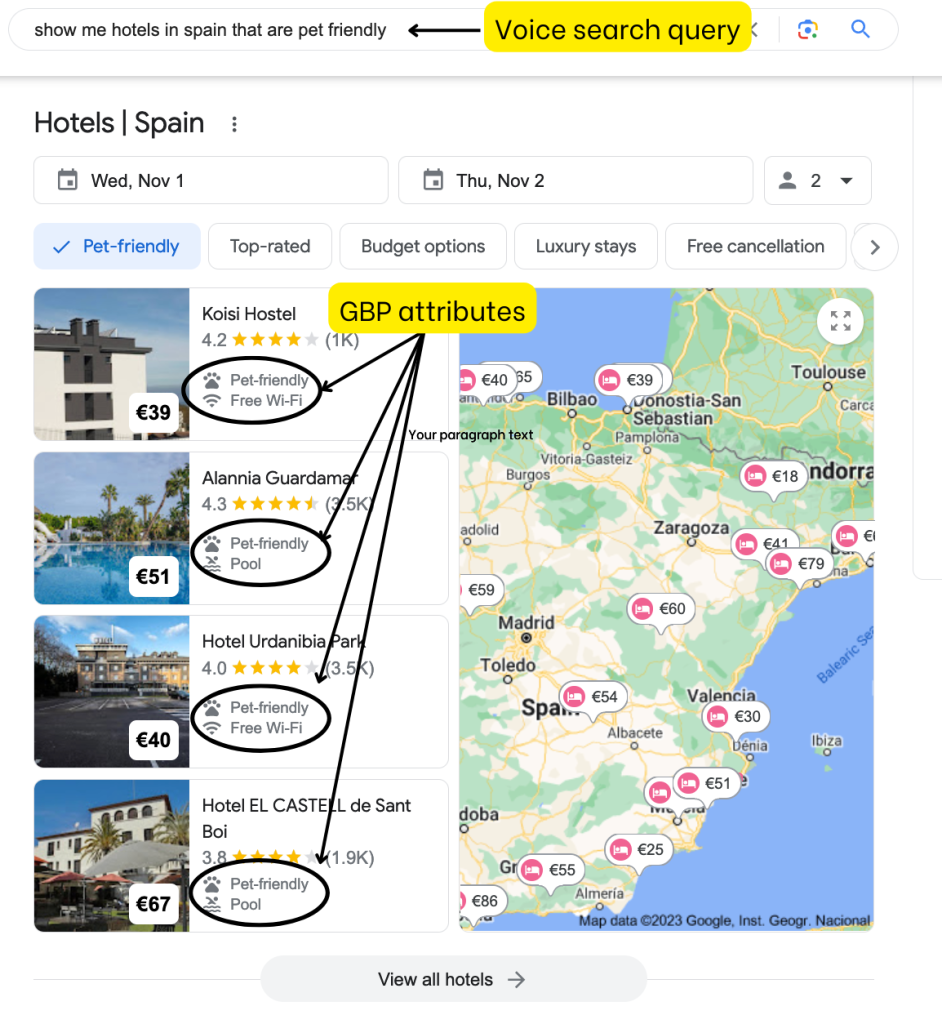
Finally, unlike other businesses, hotels aren’t able to customize the hotel description given in the knowledge panel. It’s likely that hotel descriptions are taken from various sources around the web, so it’s important that all your hotel profiles are updated regularly, not only your Google Business Profile.
Leverage high-quality photography
High-quality photos play an important role in optimizing your Google Business Profile for local search results, but also on conversion rates. This is because high-quality photography can influence potential guests’ decision to book – or not.
A good ballpark is to include at least 12-15 photographs showcasing your hotel, its rooms, and the various amenities and services available at your accommodation. By updating these photos every 6 months to a year, you also work to keep content ‘fresh’ for users and search engines.
You can also add videos and Street View-style interactive tours through your property, which can help with attracting bookings and makes your listing stand out from others, having a direct impact on your local SEO.
A good tip is to use a different set of photos on your Google Business Profile than you use on OTA websites. This not only adds originality to your listing, but it may also help your local rankings (since search engines values original content that help them to display high-quality results).
Finally, stay on top of photos submitted by users, which can vary wildly in quality. The last thing you want is a grainy, pixelated image of your rooms to be used as the featured image for your profile (it can happen!), so consider reporting any user-submitted photos that aren’t representative of your property.
Keep guests updated with Google Posts
Google Posts are an excellent tool that hoteliers can use to inform guests about announcements related to their offering.
You can create a post directly within your hotel Google Business Profile, which can be in the form of a general announcement and CTA with a link to your website, or an update about an event or special occasion that you’re organizing.
Leverage Google Posts to keep guests well-informed and drive more online engagement with your hotel. In a competitive local search landscape, regular updates like these ensure that hotels can stay in the spotlight and remain top-of-mind for travelers seeking accommodations.
Use Q&As Effectively
The Q&A (Questions and Answers) section is a feature within Google Business Profiles that allow accommodation owners to provide answers to common queries from potential guests.
In this section, hoteliers can respond to questions asked by potential customers, as well as upvote the questions that are most relevant so that they show higher up in the Q&A section. Profile owners can also create and answer their own questions, which can be a neat way of highlighting concerns (and keywords) that you think might be important to guests.
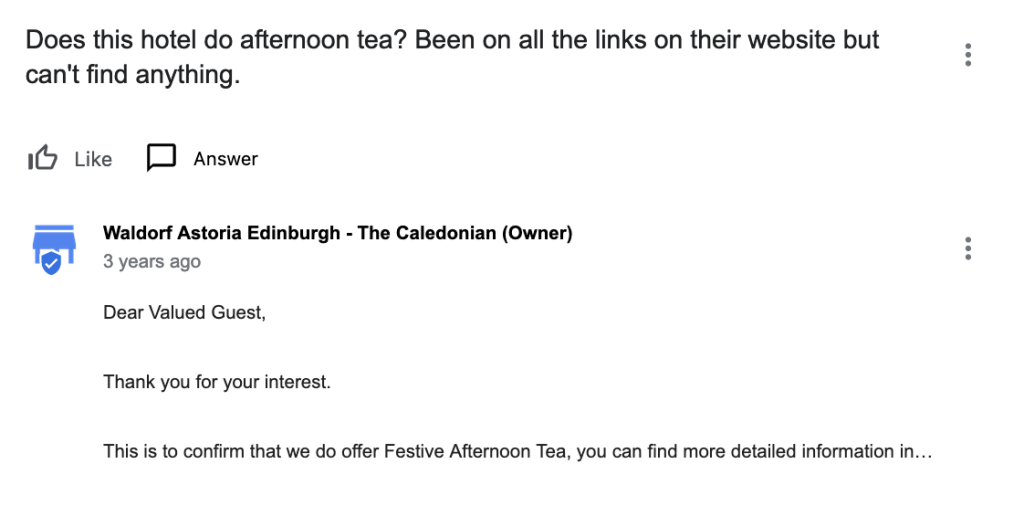
Remember that other users can also respond to questions, so being proactive with answering questions on this section will help to get your point across and maintain trust with your guests.
Managing Google reviews
Positive reviews are vital to the success of your local hotel SEO campaign, because they influence rankings within the Hotel Pack. Not only that, but reviews are instrumental in helping potential guests to decide whether they want to book with your hotel or with an alternative accommodation.
Hence, you should encourage guests to leave reviews on the various booking platforms or travel aggregators where your hotel is listed, where possible (Google will take reviews across various platforms into account).
However, having a large number of positive reviews on your Google Business Profile specifically will allow you to reap dividends in your local SEO efforts.
Responding to reviews, both positive and negative, shows that you value your customers’ opinions, and are open to listening to their concerns. This in turn builds trust, satisfaction and loyalty.
From a local SEO perspective, though, engaging with reviews provides fresh content signals to search engines that your business profile is active and well-maintained.
Smaller hotels can typically manage responding to reviews themselves, but larger companies may wish to use an online reputation management service like BrightLocal.
Keep prices up to date
Where the Hotel Pack shows pins for hotels on the map, it also shows the latest available nightly room price (usually provided by a connectivity partner or an OTA).
If you’re not signed up with a connectivity partner or OTA, or if there are no prices provided for your dates, then your listing loses prominence on the map (because all the other listings have prices and your property becomes a standard Google pin).
You can keep prices up to date by:
- Adding a direct booking link to your profile using Hotel Ads API, which integrates with your internal booking system
- Using free booking links, either through a connectivity partner or by updating your prices manually
- List yourself with OTAs like TripAdvisor or Booking.com and integrate your booking system with their platform
We suggest leveraging Google Hotels Ads API and Google’s free booking links where possible, because the commissions charged are much lower than with OTAs (with free booking links, there are no commissions charged at all)
Another point to consider is that Google have said that price relevancy is a ranking factor for Hotel Ads citation!, so it stands to reason that this may be the case for the Hotel Pack too.
Price accuracy means that your hotel website should display prices accurate to the prices displayed on Google, which are provided by third-party booking platforms or OTAs. Hence, the prices displayed on your hotel website and any third-party booking platforms should be in sync, either with the help of a third-party booking provider or with Google’s free booking links for hotels.
The importance of local citations
Local citations are links to your hotel website from around the internet. They are usually accompanied by other details such as the address, phone number and other contact details for your accommodation.
Citations help search engines to verify the legitimacy of your hotel website. The more citations that point to your hotel, the more signals ‘legitimate’ hotel business. This is one of the factors that influences your hotel’s position in the Hotel Pack for related local queries.
Therefore, building up a network of citations on various web directories is vital to your local SEO campaign.
The number of citations you build isn’t the only factor to consider, though: links are valued based on the domain authority (DA) of the referring sites, as well as the relevancy of the referring sites to your industry.
Local directories for hotels
Most hotels will already have some pre-existing citations, due to their presence on booking sites like Booking.com, TripAdvisor or Expedia.
However, it’s worth taking the time to research alternative booking sites, travel directories and OTAs, and building out dedicated profiles on each of them.
Local directories are particularly valuable, since they provide strong signals to search engines to return your hotel for local queries. Likewise, directories that are extremely relevant to your hotel, such as directories that only feature hotels with facilities similar to yours, such as rooftop pool directories, for example, will add strong local signals.
I usually recommend that hotel marketers set aside a block of time each week to submit their hotel to relevant directories on a local, national or international level. There are lots free and paid directories available (here is a starter list of mostly free hotel directories).
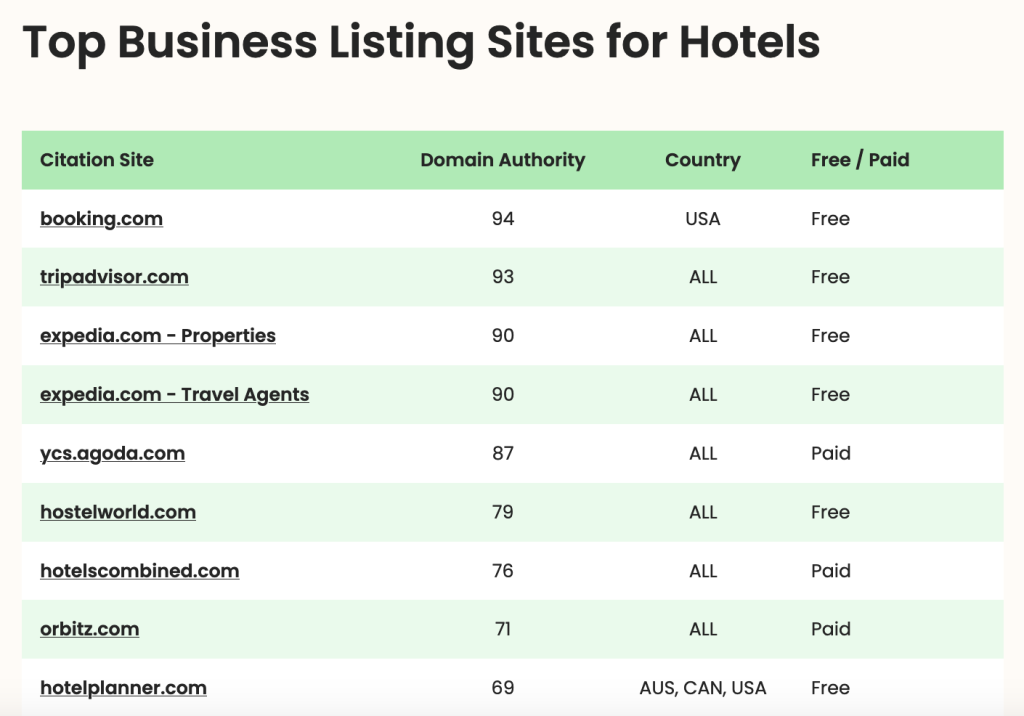
You can find more using Google search, or you can scan backlinks gained by similar hotels with a strong local SEO presence to find the directories that they are listed on.
After finding the relevant directories to build citations from, you can check the the domain authority of directories using a domain analysis tool like Moz to see whether it’s worth setting up a profile on that site.
NAP consistency for hotels
One of the quirks of local citation building is the need to maintain NAP (name – address – phone number) consistency across the directories where your hotel is listed.
This seems simple, but it’s surprisingly easy to give an address or phone number in one format in a certain directory, then a different format in a different directory.
For example, you may accidentally write your street name before the area in one directory when it’s usually written the other way around. Or, you may submit your phone number with an international dialing code in one directory, and give a local number to another directory.
I use a simple trick to take care of NAP consistency: copy the exact details used in your Google Business Profile into a spreadsheet or document, which you can leave open while you submit your hotel to the various directory sites that you choose. This will ensure your data remains consistent across the web.
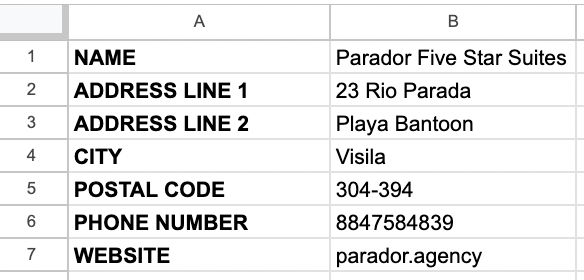
Equally, take care to stick to one listing for your hotel per directory. Duplicate listings can be confusing for search engines, and they will undermine your efforts to build out a healthy, balanced portfolio of local citations.
Local citation building is about making sure that accurate and up-to-date information about your hotel is available across the internet. This builds trust with customers, and with search engines too. The top ranking hotels in the Hotel Pack have hundreds of local, national and international citations pointing to their website, which is testament to the importance of citations for local SEO success.
Writing and publishing local content
Let’s move away from the Google Business Profile and local directories to focus on a local SEO task that you can carry out within your hotel website itself.
I’m talking specifically about the blog section of your website. If you don’t have a blog yet, get one!
Here’s why.
Publishing regular blog posts that speak about your local area helps your website to surface for different types of keywords than ‘hotel in [area]’.
These keywords are just as valuable, because they target people who are in the planning stage of their trip.
To illustrate how valuable travel content is for driving bookings, consider that travelers in the US view an average of 277 pages in the 45 days leading up to a vacation, with 61% of that research being conducted through search engines.
By writing consistent blog posts around local keywords, you can turn your hotel website into a ‘concierge’ for your destination that moves potential guests down your marketing funnel towards a booking.
Here are some examples of content you can write on your hotel blog:
- “Top Attractions Near [Your Hotel’s Area]”
- “A Guide to [Your City] for First-Time Visitors”
- “Best Family-Friendly Activities in [Your City]”
- “Romantic Getaways in [Your City]”
- “Local Food In [Your Hotel’s Area]”
The blog posts you write should be backed up by a proper keyword research strategy, which ensures that you are writing about topics that future travelers to your destination are searching.
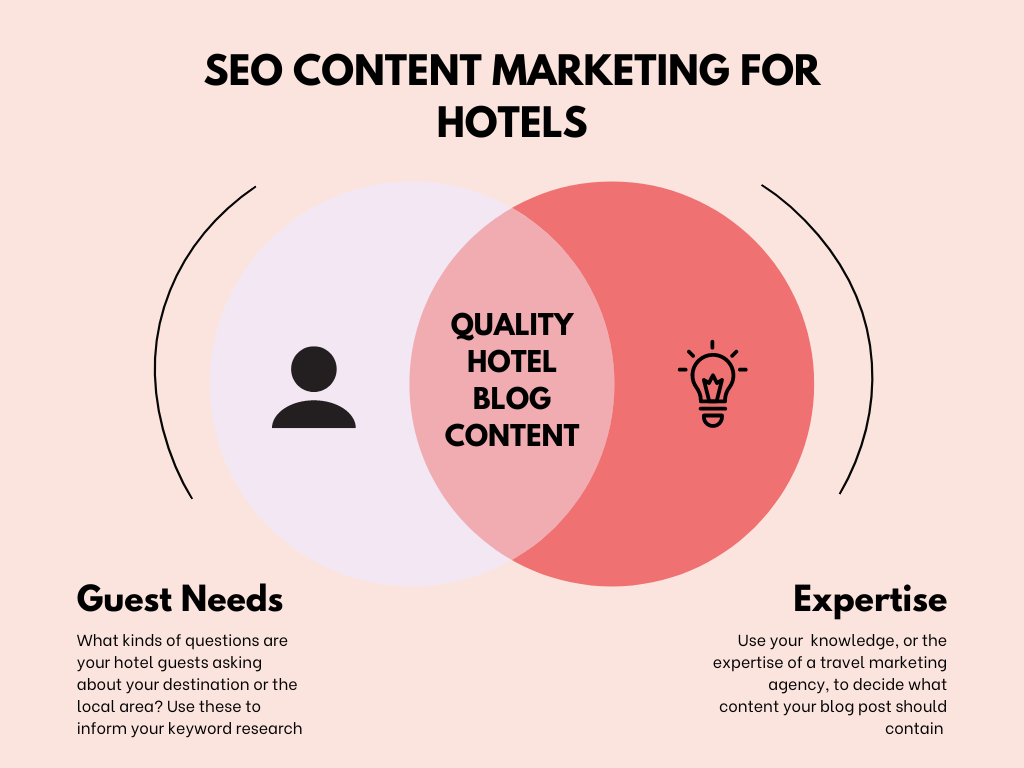
Once you have a list of keywords in place, draw on your own local knowledge or work with a dedicated travel content marketing agency to produce high-quality, SEO-optimized posts around your chosen keywords.
Not only will this blog content expose your business to more visitors who are interested in your destination, it can also be a source of backlinks for your hotel website.
Finally, high-quality local blog posts can increase the authority of your site around the topic of your local area, which can indirectly give a boost to your relevance for ‘local area + hotel’ keywords in the Hotel Pack.
In essence, a dedicated blog content marketing strategy is a powerful tool for hotels that want to increase their local SEO presence.
Unlock the potential of your hotel’s online presence and boost bookings with our dedicated Travel Content Pro solutions, offering a tailor-made content strategy, blog writing, publishing, SEO optimization and engagement tactics that brings the best out of your hotel brand.
Get direct bookings through SEO content
Outrank the OTAs and fill your calendar with direct bookings using Travel Content Pro, our end-to-end SEO content marketing service.
Pricing PlansHotel schema and structured data
Hotel schema is a form of structured data that can be worked into important pages on your hotel website. The purpose of structured data is to help search engines identify different types or categories of information within your page more clearly, and then serve that information to users when they type a query.
In addition to the hotel meta description, which is the short text description given to a page, search engines use structured data to show additional information such as star ratings underneath organic results. Google can show this information because the website owner has used the correct type of hotel schema to identify the section of their page that contains reviews.

Using hotel schema has several advantages, including:
- Allowing search engines to better understand the characteristics and location data of your hotel, which can help with local rankings
- Giving you more ‘real estate’ on the search engine results page through rich snippets (these are extensions to normal organic results enabled by structured data), which can increase click-through rate
- Allowing searchers to get a full overview of the type of facilities your hotel provides, which can lead to more qualified leads
- Opening up your hotel website to results from voice searches
The Lodging Business Schema is the most important type of structured data for accommodation owners, because it allows you to be clear about the type of accommodation they operate.
The Hotel Schema is a subclass of the Lodging Business schema, and this markup will allow you to define information such as amenities, check in times, room numbers and hotel policies.
Finally the LocalBusiness schema, while not strictly a hotel or accommodation schema, can help with local SEO for hotels because it relates to your business address and contact details.
For hotels with multiple locations, LocalBusiness becomes essential. Multiple locations can give rise to unclear address data or ambiguity, and LocalBusiness can be used to differentiate between your different branches.
By providing a unique identifier, such as a structured name, for each location within your hotel chain, you can give different attributes such as separate contact details, amenities, ratings and reviews to each of the branches within your hotel chain.
Hotel chains that implement structured data in this way are helping search engines to understand that each hotel in the franchise is a distinct property with its own characteristics and offerings. This can enhance the visibility of each location in the local search results and help potential guests find the specific hotel that best suits their needs and preferences.
How to add structured data
Structured data is inserted into your pages in the <head> section of your HTML, or at the relevant section of the page. If you’re using WordPress, markup plugins like Yoast SEO or WP SEO Structured Data Schema will help you to implement the correct structured data for your hotel without having to use JSON-LD or Microdata.
Once your structured data is implemented, use Google’s Structured Data testing tools to check for rich snippets, and for any errors in the schema. This tool is developed by the Google itself, which means it’s specifically designed to check that your location-specific information is accurately understood by search engines (which, in turn, enhances your visibility in local search results).
Optimizing local page experience
Page experience is a term used to refer to how usable a website page is from a user perspective.Rather than just the information available on the page, page experience looks at how easily a user can access and interact with that information.
For example, people value OTAs because they allow them to make bookings quickly and easily, which in itself is a good page experience signal.
Not only can good page experience signals, such as page speed, lead to better local rankings, but it also means better engagement rates from visitors to your site.
Hence, If you’ve invested in your local hotel SEO to the point where you’re getting consistent clicks from search, it’s paramount that you don’t lose engagement once searchers are actually ready to make a booking from your site.
You can check engagement rate on your local landing pages in Google Analytics by going to Reports → Engagement, → Pages and Screens.
Things you can do to for a better page experience include:
- Optimize page speed and Core Web Vitals, with your local landing pages as a priority
- Mobile optimize, since local searches tend to happen on mobile devices (when people are on the go, for example). Websites that are mobile-friendly, responsive, and offer a good user experience on both smartphones and tablets are more likely to rank well in local searches.
- Secure your site with an SSL certificate and HTTPS data transmission
- Keep information accurate with details that you’ve submitted on your Google Business Profile and other directories
- Easy-to-use navigation that helps potential guests to easily find the information or section that they’re looking
- Publish high-quality content that is easy for users to read, scan and navigate, as well as being valuable
Embracing local SEO for hotels in the digital age
In conclusion, optimizing your hotel’s online presence for local searches can make a world of difference in attracting guests and boosting revenue.
By focusing on USP-led keyword research, an optimized Google Business Profile, directory citations and high quality blog posts, hotels can significantly enhance their visibility in local search results.

